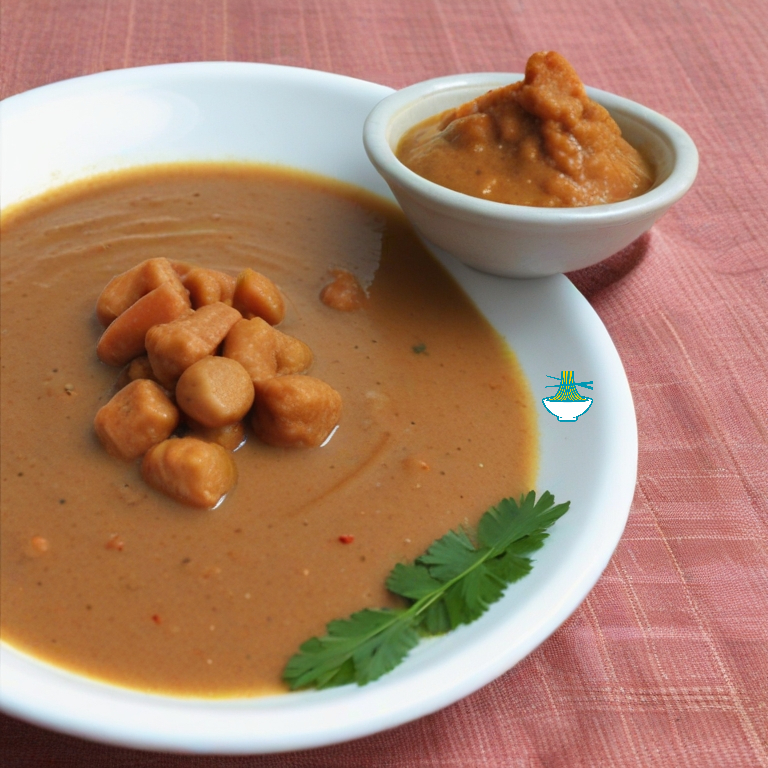Katapa is a traditional Zambian dish featuring a rich groundnut sauce served alongside nshima, a staple food in Zambia. The sauce is made from roasted and ground groundnuts, cooked with onions, tomatoes, and spices to create a flavorful accompaniment. It's a popular dish in Zambia, enjoyed for its delicious taste and nutritional value, often served during special occasions and gatherings.
Ingredients:
- 1 cup groundnuts (peanuts), roasted and peeled
- 1 onion, finely chopped
- 2 tomatoes, chopped
- 2 tablespoons vegetable oil
- 1 teaspoon salt, or to taste
- 1/2 teaspoon pepper, or to taste
- Water, as needed

Method of Preparation:
1. Grind the roasted and peeled groundnuts into a fine powder using a food processor or mortar and pestle.
2. In a saucepan, heat the vegetable oil over medium heat.
3. Add the chopped onions and sauté until translucent.
4. Add the chopped tomatoes and cook until they soften.
5. Stir in the groundnut powder and mix well with the onions and tomatoes.
6. Add water gradually while stirring to achieve your desired consistency for the sauce.
7. Season with salt and pepper to taste.
8. Simmer the sauce for about 10-15 minutes, stirring occasionally, until it thickens slightly and the flavors meld together.
9. Serve the Katapa sauce hot with nshima or any other staple of your choice.
Nutrition Value:
1. Groundnuts (Peanuts), Roasted and Peeled (1 cup):
- Calories: Approximately 828 kcal
- Carbohydrates: About 24 grams
- Protein: Around 38 grams
- Fat: Roughly 71 grams
- Sodium: Minimal, typically less than 5 mg
- Cholesterol: None
- Vitamins: High in Vitamin E and B vitamins, especially niacin (B3)
- Minerals: Rich in magnesium, phosphorus, and potassium
- Nutritional Benefits: Groundnuts are a good source of plant-based protein, healthy fats, and essential nutrients like vitamin E and magnesium. They also provide energy and support heart health.
2. Onion, Finely Chopped (1 onion):
- Calories: About 44 kcal
- Carbohydrates: Approximately 10 grams
- Protein: About 1 gram
- Fat: Minimal, typically less than 0.5 grams
- Sodium: Minimal, typically less than 5 mg
- Cholesterol: None
- Vitamins: High in Vitamin C, Vitamin B6, and folate
- Minerals: Contains potassium, phosphorus, and trace amounts of other minerals
- Nutritional Benefits: Onions are low in calories and rich in antioxidants like quercetin. They also provide vitamins and minerals that support immune function and overall health.
3. Tomatoes, Chopped (2 tomatoes):
- Calories: Approximately 33 kcal
- Carbohydrates: About 7 grams
- Protein: Around 1 gram
- Fat: Minimal, typically less than 0.5 grams
- Sodium: Minimal, typically less than 5 mg
- Cholesterol: None
- Vitamins: High in Vitamin C, Vitamin A, and Vitamin K
- Minerals: Contains potassium, manganese, and trace amounts of other minerals
- Nutritional Benefits: Tomatoes are rich in antioxidants like lycopene, which may help reduce the risk of chronic diseases. They also provide vitamins and minerals that support skin, vision, and bone health.
4. Vegetable Oil (2 tablespoons):
- Calories: About 240 kcal
- Carbohydrates: None
- Protein: None
- Fat: Approximately 28 grams
- Sodium: Minimal, typically less than 5 mg
- Cholesterol: None
- Vitamins: Contains Vitamin E
- Minerals: Minimal
- Nutritional Benefits: Vegetable oil provides energy and essential fatty acids. However, it's important to use in moderation due to its high calorie and fat content.
5. Salt (1 teaspoon, or to taste):
- Calories: None
- Carbohydrates: None
- Protein: None
- Fat: None
- Sodium: Approximately 2,325 mg (based on standard table salt)
- Cholesterol: None
- Vitamins: None
- Minerals: Contains sodium
- Nutritional Benefits: Salt adds flavor to the dish but should be used in moderation to avoid excessive sodium intake, which can contribute to high blood pressure and other health issues.
6. Pepper (1/2 teaspoon, or to taste):
- Calories: None
- Carbohydrates: None
- Protein: None
- Fat: None
- Sodium: Minimal, typically less than 1 mg
- Cholesterol: None
- Vitamins: Contains Vitamin C
- Minerals: Contains potassium, manganese, and trace amounts of other minerals
- Nutritional Benefits: Pepper adds spice and flavor without adding significant calories or nutrients. It may have antioxidant and anti-inflammatory properties.
7. Water, as needed:
- Calories: None
- Carbohydrates: None
- Protein: None
- Fat: None
- Sodium: None
- Cholesterol: None
- Vitamins: None
- Minerals: None
- Nutritional Benefits: Water is essential for hydration and helps in cooking the ingredients to the desired consistency without adding extra calories or nutrients.


Comments